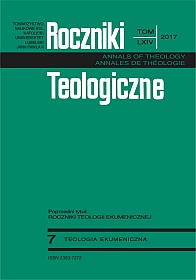Purifying Judgment of God: Ecumenical “Bilingualisation” of the Teaching about Post-mortem Purification in the Light of Biographical Research
Abstract
The purpose of the article is an attempt to indicate, based on the implications of the in the social sciences developed biographical perspective, the convergence in the theological description of the eschatological purification and judgment of God on the Catholic and Protestant side. The abovementioned research perspective exposes, among others, durability of individual biography, the importance of self-discovery and inalienable responsibility for maturation to fully own identity. This type of categories have found reception, both in the Catholic and Protestant theology, without having abandoned their doctrinal assumptions and being able to formulate complementary and converging statements. The post-conciliar Catholic theology explains the eschatological purification as a process of personal maturation for meeting with God, as well as transforming man’s encounter with God as Judge. In the more recent Protestant theology one can find such interpretations of God’s judgment, which demonstrate its processual character and purifying sense in the perspective of individual life history.
References
Alheit Peter, Hoerning Erika (red.): Biographisches Wissen. Beiträge zu einer Theorie lebensgeschichtlicher Erfahrung, Frankfurt – New York: Campus Verlag 1989.
Almen Lowell G., Sklba Richard J. (red.): The Hope of Eternal Life. Lutherans and Catholics In Dialogue XI, Minneapolis, MN: Lutheran University Press 2011.
Balthasar Hans Urs von: Eschatologia w naszych czasach, tłum. W. Szymona, Kraków: Wydawnictwo WAM 2008.
Beinert Wolfgang, Kühn Ulrich: Ökumenische Dogmatik, Leipzig: Evangelische Verlagsanstalt – Regensburg: Verlag Friedrich Pustet 2013.
Czyżewski Marek: Socjologia interpretatywna i metoda biograficzna: przemiana funkcji, antyesencjalistyczne wątpliwości oraz sprawa krytyki, „Przegląd Socjologii Jakościowej” 9 (2013), nr 4, s. 14–27.
Fuchs Werner: Biographische Forschung. Eine Einführung in Praxis und Methoden, Opladen: VS Verlag für Sozialwissenschaften 1984.
Gestrich Christof: Die Seele des Menschen und die Hoffnung der Christen. Evangelische Eschatologie vor der Erneuerung, Frankfurt am Main: Edition Chrismon 2009.
Golczyńska-Grondas Agnieszka, Grondas Marek: Biographical Research and Treatment. Some Remarks on Therapeutic Aspects of Sociological Biographical Interviews, „Przegląd Socjologii Jakościowej” 9 (2013) nr 4, s. 28-49.
Greshake Gisbert: Życie silniejsze niż śmierć. O nadziei chrześcijańskiej, tłum. Joanna Kubaszczyk, Poznań: Wydawnictwo „W Drodze“ 2010.
Hryniewicz Wacław: Oczekuję życia w przyszłym świecie. Wydarzenia ostateczne w dialogu chrześcijan, Poznań: Wydawnictwo Święty Wojciech 2013.
Jenson Robert: The Great Transformation, w: Carl E. Braaten, Robert Jenson (red.), The Last Things. Biblical and Theological Perspectives on Eschatology, Grand Rapids, MI – Cambridge, U.K.: Wm. B. Eerdmans Publishing Co. 2002, s. 33–42.
Kaźmierska Kaja: Badania biograficzne w naukach społecznych, „Przegląd Socjologii Jakościowej” 9 (2013) nr 3, s. 6-10.
Kaźmierska Kaja: Biography and Memory. The Generational Experience of the Shoah Survivors, Boston: Academic Studies Press 2012.
Körtner Ulrich H.J.: Die letzten Dinge, Neukirchen-Vluyn: Neukirchener Verlagsgesellschaft 2014.
Link-Wieczorek Ulrike: Vom Werden des Heils. Eine Replik auf Jürgen Werbick, w: Uwe Swarat, Thomas Söding (red.), Gemeinsame Hoffnung – über den Tod hinaus. Eschatologie im ökumenischen Gespräch, Freiburg–Basel–Wien: Herder 2013, s. 209-226.
Maffeis Angelo: Die aktuelle Situation des Dialogs. Ökumene des Konsenses und der Differenzen. Eine katholische Sichtweise, w: Fulvio Ferrario (red.), Umstrittene Ökumene. Katholizismus und Protestantismus 50 Jahre nach dem Vatikanum II, Tübingen: Mohr Siebeck 2013, s. 37-55.
Nocke Franz-Josef: Eschatologie, w: Theodor Schneider (red.), Handbuch der Dogmatik, t. II, Düsseldorf: Patmos 2000, s. 377-478.
Sattler Dorothea: Gottes Gericht und die geläuterte Selbsterkenntnis des Menschen. Versuch einer Verhältnisbestimmung in ökumenischer Perspektive, w: Uwe Swarat, Thomas Söding (red.), Gemeinsame Hoffnung – über den Tod hinaus. Eschatologie im ökumenischen Gespräch, Freiburg–Basel–Wien: Herder 2013, s. 109-130.
Sattler Dorothea: Selbstthematisierung im Selbstgericht. Zur Rezeption der Biographieforschung in der Eschatologie, „Theologie der Gegenwart” 42 (1999), s. 92-105.
Skwierczyński Antoni: Miłość oczyszczająca. Współczesna interpretacja katolickiej nauki o czyśćcu, Warszawa: Wydawnictwo Księży Marianów 1992.
Thomas Günther: Gottes schöpferische Gerechtigkeit, w: Ruth Heß i Martin Leiner (red.), Alles in allem. Eschatologische Anstöße, Neukirchen: Neukirchener Verlagsgesellschaft 2005, s. 109-132.
Thomas Günter: Neue Schöpfung. Systematisch-theologische Untersuchungen zur Hoffnung auf das „Leben in der zukünftigen Welt“, Neukirchen-Vluyn: Neukirchener Verlagsgesellschaft 2009.
Thönissen Wolfgang: Gerechtigkeit oder Barmherzigkeit. Das ökumenische Ringen um die Rechtfertigung, Paderborn: Bonifatius Verlag – Leipzig: Evangelische Verlagsanstalt 2016.
Union Evangelischer Kirchen (red.): Unsere Hoffnung auf das ewige Leben. Ein Votum der Union Evangelischer Kirchen in der EKD, Neukirchen-Vluyn: Neukirchener Verlagsgesellschaft 2008(2).
Voges Wolfgang (red.): Methoden der Biographie- und Lebenslaufforschung, Opladen: VS Verlag für Sozialwissenschaften 1987.
Wspólna deklaracja w sprawie nauki o usprawiedliwieniu, w: Karol Karski, Stanisław Celestyn Napiórkowski (red.), Bliżej wspólnoty. Katolicy i luteranie w dialogu 1965–2000, Lublin: TN KUL 2003, s. 499-523.
Copyright (c) 2017 Roczniki Teologiczne

This work is licensed under a Creative Commons Attribution-NonCommercial-NoDerivatives 4.0 International License.





